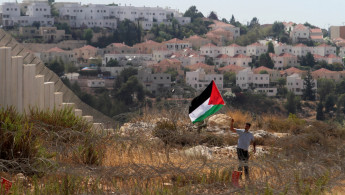Palestinian political experts doubt any de-escalation with Israel this year
It seems that the Palestinian-Israeli tensions will not be de-escalated in the occupied West Bank at least during 2023, several Palestinian political experts opined to The New Arab.
"With the endless US support, Israel is protected from any international or Arab condemnation or rejection," said one of the political experts.
What made the matter worse, according to the experts, was normalising the political ties between Israel and several Arab countries, which means that the Palestinians "are alone in their conflict with Israel."
Over the year, the Israeli occupation has been escalating its crimes against the Palestinians in the occupied West Bank and Jerusalem.
Since the beginning of 2022, the Israeli army carry out violent raids on Palestinian towns and cities, including those supposedly under full control of the Palestinian Authority according to the 1993 Oslo agreement.
Israeli settlers rampaged through the occupied West Bank again on Tuesday - the third consecutive day of pogroms against Palestinian villages. https://t.co/HBM0aMKPnO
— The New Arab (@The_NewArab) February 28, 2023
This year, at least 63 Palestinians were killed by the Israeli army, while hundreds of others were wounded during confrontations with the Israeli military as well as illegal Israel settlers.
"Because of the Israeli crimes against their holy places, lands and rights, the Palestinians decided to confront the occupation by their own means, including stones, knives as well as some weapons to defend themselves," Hussam al-Dajani, a Gaza-based political expert, said to TNA.
"Israel has been escalating its crimes against our people in the West Bank. It is doing its best to eliminate the state of the revolution and thwart the uprising in the region," he added.
On Sunday, reportedly due to US pressures, Jordan hosted a summit in the city of Aqaba with Israeli and Palestinian officials. The summit, attended by the US Middle East envoy Brett McGurk, as well as Jordanian and Egyptian officials, comes as Israeli forces continued deadly raids on the occupied West Bank.
The Palestinian Authority said its delegation went into the meeting to demand "an end to the policy of assassinations, incursions, the Judaisation of occupied Jerusalem, settlement expansion, and unilateral Israeli measures" according to a statement shared with the press.
Following the eight-hour meeting, King Abdullah II of Jordan called for a de-escalation in the Palestinian territories and urged both sides to avoid unilateral measures that could lead to instability.
However, Dajani believed that the summit aimed to "undermine the Palestinian revolution in the West Bank, so that it does not continue into the month of Ramadan or spread to Gaza, based on the US plan to reduce tension in Jerusalem and the West Bank."
The same opinion was shared by Iyad al-Qarra, another political expert based in Gaza. "The summit will not de-escalate in the West Bank as the Israeli occupation will not end its crimes against our people," he said to TNA.
"The summit is mainly based on strengthening the Palestinian authority in the West Bank, pressuring the occupying state to stop its incursions and massacres, like what happened in Nablus, and bypass the possibility of a confrontation with Gaza," Qarra said.
"Netanyahu is looking forward to using the meeting to put more pressure on supporters of the Palestinian cause," he added. "The occupying state will not offer the Palestinian Authority anything through this summit, other than treachery."
"Israel has turned against the Oslo Accord, which was sponsored by almost the whole world, led by the United States. Israel has practically ended the two-state solution on the ground, and killed, besieged and desecrated, and it will continue to do so," he stressed.
For his part, Hani al-Masri, a Ramallah-based political expert told TNA, "We are going to witness more tensions between the Palestinian youth and the Israeli army in the West Bank."
To de-escalate to tensions, al-Masri argued Israel must "stop settlement expansion, stop the policy and procedures for changing the status of Al -Aqsa, Judaising Jerusalem, demolishing homes, assassinations and arrests, canceling administrative detention, creeping annexation of Area C, siege on the Gaza Strip, abolishing procedures against prisoners and withdrawing racist laws that were recently approved."





 Follow the Middle East's top stories in English at The New Arab on Google News
Follow the Middle East's top stories in English at The New Arab on Google News


